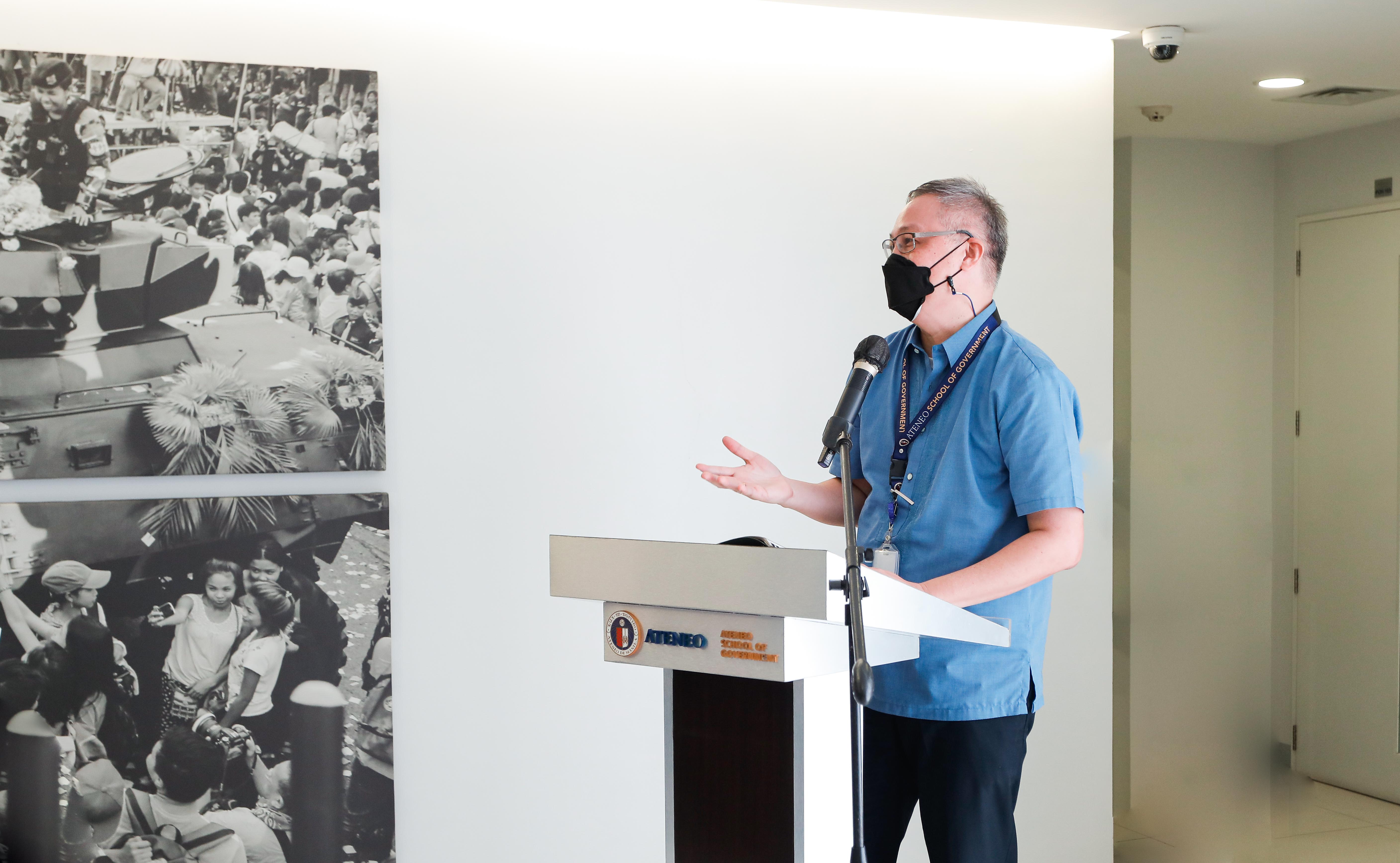SPEECH: ASoG Dean Randy Tuaño highlights commitment to democratic, participative, and sustainable social development for the Philippines
19 Aug 2022
Remarks during the Thanksgiving and Turn-Over Ceremony
Philip Arnold P. Tuaño
August 12, 2022
Ateneo School of Government

Congratulations Dean Ron for your years of dedicated service to the ASOG! The university community is certainly proud of your achievements, and we wish you all the best in your forthcoming endeavors, including as the School’s new senior research fellow, which we are sure to be as successful as these past six years.
Fr. Ben Nebres,SJ, Fr. Pat Falguera SJ, vice president Rudy Ang and other university officials, Dean Ron Mendoza and family, including Secretary Ging Deles, who was my boss in a previous life in government service, and the administrators, faculty and staff, and friends of the ASOG, good afternoon. We give thanks in this turn-over ceremony all the blessings that the School of Government has received these past years. We especially thank the faculty, staff and students who has brought the ASOG to what is today- a recognized center of excellence in leadership and public administration in the Philippines and also in the Asia-Pacific region.
We thank Dean Ron, who has built on the tireless efforts of our past administrators- Dean Dina Abad, Dean Tonette Angeles, and Dean Tony La Viña- in enlarging the reform constituencies that the School has been working with and the partnerships that it has built, especially in the national security and health sectors, and in many local governments such as Calapan, Iloilo, Vigan, Marawi and other cities in the country.
We also thank the university leadership, especially Fr. Jett and Fr. Bobby, who have made significant investments to the School. These allowed the ASOG to add more faculty, staff and experts who have supported the expansion of the student population, increased its research output, and organized more outreach projects in the areas of political reform and participation, health equity, access to energy and power and strengthening the inclusivity of economic markets. Maraming, maraming salamat po!
Even as we recognize all of these fruits that the School has received, we know that all of these are happening in the backdrop of the continuing economic, political and social challenges. The ongoing pandemic has deepened the inequitable distribution of power and wealth; according to the government’s own statistics, the number of families who are below the poverty line last year increased by seven hundred thousand compared to three years ago. Initial indications in the School’s political research is that there has been a slight increase in what Dean Ron calls as “thick” dynasties holding office across most local government positions after this last round of elections. We have also again become more aware but certainly should not be surprised, as Fr. Ben has repeatedly told us, of the challenges in our education and health systems when the World Bank recently published a report showing 90 percent of ten-year-old Filipinos are “learning deprived”; and also, that around a third of children under five years old are stunted, a proportion which has not significantly declined in the past twenty-five years.
This lack of progress in achieving good development outcomes has been closely linked with weak governance institutions and the decline of democratic practices and norms. Rising animosity and tensions in politics that hinder the development of social consensus on resolving our problems have grown in the past years, while the commitment to transparency, accountability and human rights have significantly slackened. Structures for the participation of marginalized sectors at the national and local levels need to be reinvigorated so that they can share in the fruits of economic growth. We have also seen recently a sense of diminished hope and futility among many of our youth in participating in electoral politics.
Thus, this current situation poses continuing challenges for the School that need to be addressed urgently, and it is in this ceremony that we recommit ourselves in undertaking the following:
First, we need to ensure that our students and stakeholders have a better understanding of the relationship between democratic politics, good governance practices and development outcomes. Politics has been said to be the ability to navigate the structures of power. One continuing challenge that needs to be addressed is how do we strengthen our teaching and research to effectively utilize the levers of power for the economic and social reforms needed in the country. While we have much knowledge on the development outcomes and reforms, we have to better understand how to utilize the democratic exercise of political power in order to achieve the public good. This will imply a further strengthening of the School’s good governance framework that guides our teaching and research to better shape the formation work of leaders for others that we are undertaking.
Second, we will continue to engage our partners in the national government, who display a strong commitment to democratic governance and reforms. Clearly, there are many urgent tasks in the country’s social, environmental and economic progress, which forms part of the university’s strategic areas of education reform and transformation, universal health and wellbeing, integral ecology and bridging cultural divides. Many of our public officials, including our alumni, will need support and assistance, especially in areas that we have technical expertise, which the Ateneo Policy Center, the school’s research arm, has already built.
Third, we will continue to expand opportunities with our local government partners to further support autonomy and devolution in the country, given that we expect that fiscal decentralization efforts will be given a boost in the coming years. We hope to continue to bring our academic and executive education programs in these areas, including our growing work with partners in the Bangsamoro Autonomous Region for Muslim Mindanao, and support program initiatives that address their development concerns.
Fourth, addressing the challenges in the practice of democracy and human rights, including misinformation and disinformation, and ensuring that we strengthen our efforts towards political and citizenship education among a broad constituency of stakeholders through the expansion of our projects in political participation.
And yet in our work that we wish to undertake in these different areas, we hope that our actions are guided by what Pope Francis said about the genuine meaning of politics. Politics is Encounter. Reflection and Action.
First, encounter. We are constantly challenged to be open to others, accept and respect differences, and thus we are asked to expand our capacity to undertake dialogues with different individuals and groups, whose views may be different from our own, in a culture of accountability and a commitment to the truth. Second, reflection. To discern proposals and ideas that go beyond differing and even diametrically opposed interests in order to advance the common good. In this, we are mindful of the concrete actions that we can undertake that can directly benefit the most vulnerable. And lastly, to act, by building communities that can commit to actions that strengthen social and economic welfare and devising effective means to this end.
Given the importance of building these reform communities that will strive for the common good, we will continue to form leaders and public servants that support the greater empowerment and autonomy of people’s organizations and citizens’ groups, to assist them in developing their own alternatives and to reinforce their ability to bring their proposed policies and programs to the institutions of power. In this, we will continue to be very much mindful of ensuring that the hallmarks of Jesuit education- academic excellence, spiritual rootedness and immersive engagement with society- and our university core values and norms, including preferential option for the poor and servant leadership- be integrated in all our programs.
Sa pinakahuli, ang ating sama-samang pagpupunyagi ay magiging matagumpay lamang kung natamo natin ang nakasaad na pangarap o “vision” ng ating Paaralan: ang pagbubuo ng mga masagana, maunlad, makatarungan at masayang pamayanan na nakaugat sa pagpapalalim ng mga demokratikong proseso ng ating mga institusyon at may tunay na pananagutan sa ating sambayanan. Maraming salamat at magandang hapon sa lahat!




